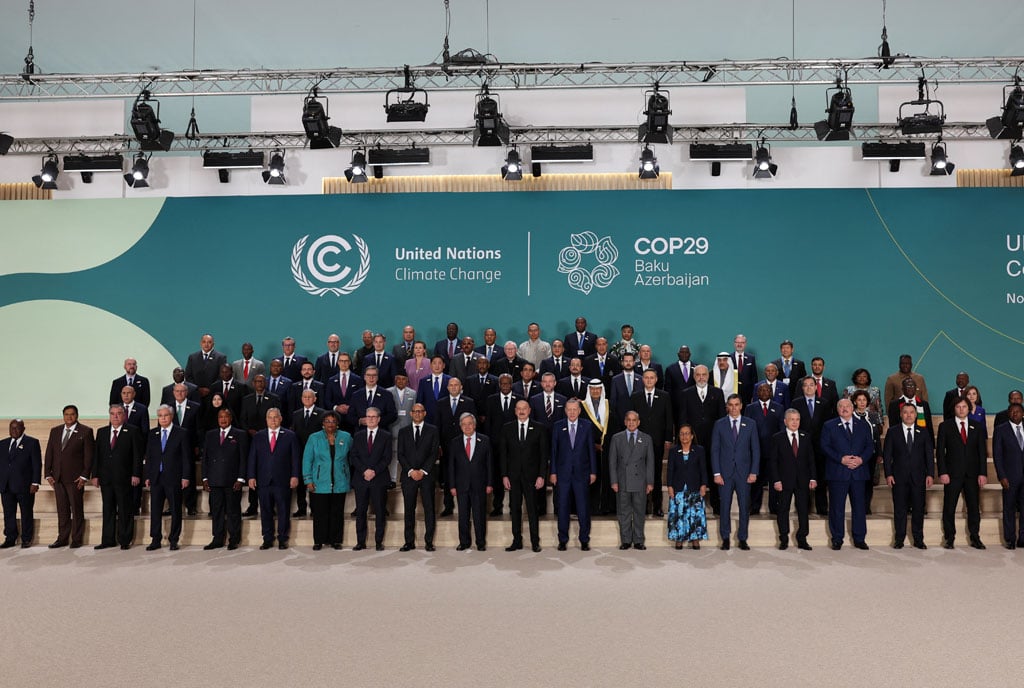Beyond the global headlines: Why COP29 matters to you and your community

World leaders attending the United Nations climate change conference, known as COP29, pose for a family photo in Baku, Azerbaijan November 12, 2024. PHOTO/REUTERS
What you need to know:
- Parties especially from the developing parts of the world like Uganda should interest themselves in areas that will improve resilience of their people. Areas that speak directly to the common man’s interest are;-Indigenous peoples and local communities as climate steward, the role of Indigenous Peoples and local communities in protecting nature is key and equally should be their interests and rights.
From 11th to 20th November 2024, Azerbaijan will be hosting the 29th United Nations Climate Change conference (COP29). This is a conference that brings together world leaders and negotiators from the 198 member states (parties) of the United Nations Framework Convention on Climate Change (UNFCCC) to assess progress, set new targets, and deepen their commitments to global climate goals.
During this conference, the key task for the COP is to review the reports submitted by Parties on their greenhouse gas emissions and climate action.COP29 is especially focused on actions that enhance climate resilience, the ability to cope with and recover from climate impacts like floods, droughts, and rising sea levels.
Parties especially from the developing parts of the world like Uganda should interest themselves in areas that will improve resilience of their people. Areas that speak directly to the common man’s interest are;-Indigenous peoples and local communities as climate steward, the role of Indigenous Peoples and local communities in protecting nature is key and equally should be their interests and rights.
At this conference, parties mostly developed countries should recognize the valuable contributions these groups make toward conservation and resilience, especially under the new UAE Framework for Global Climate Resilience, which highlights their roles as protectors of biodiversity and ecosystems.
Incorporating gender, human rights, and Transparency into Climate Policies. At the negotiators from the least developed countries should push for climate policies that address social issues such as gender equality, transparency, and human rights.
These policies will ensure that climate actions are fair and inclusive, taking into account the needs of vulnerable groups, such as women and children, and supporting equitable access to resources.Parties are expected to commit financial support towards the realisation of Nairobi work programme on impacts, vulnerability and adaptation to climate change.
This program is especially important for regions that are already facing severe climate. It is very important for least developed counties like Uganda to take centre stage in this discussion as it is the only practical ways to build its resilience. The push for an inclusiveness and regional representativeness of Warsaw International Mechanism on loss and damage (WIM) Institutional structures.
Loss and damage refers to the negative impacts of climate change that cannot be avoided through mitigation or adaptation efforts. It encompasses the consequences of climate change, including economic losses, non-economic losses such as cultural or social losses, and the costs of recovery from climate-related events.
The Warsaw International Mechanism on Loss and Damage (WIM), established in 2013, aims to provide financial, technical, and capacity-building support to countries that are most affected by these impacts. For least developed countries (LDC) like Uganda, it is crucial for them to ensure an inclusive and regional representation in the WIM’s institutional structures, such as the Executive Committee, expert groups, and the technical expert group.
It is essential for LDC perspectives to be included in the global dialogue on loss and damage to allow consideration of their specific needs, such as tailored financial assistance and capacity-building initiatives. Moreover, regional representativeness helps ensure that solutions and support are context specific.
Lastly, at COP29, there will be a discussion on financial commitments to support cooperative approaches to climate action under Article 6 of the Paris Agreement.
Uganda should actively participate in discussions because it directly impacts it’s access to resources and tools needed to mitigate and adapt to climate change. Mechanisms under the Paris agreement Article 6 allow countries to collaborate on emission reductions and share the financial benefits of climate action. If well aligned, these mechanisms can provide new sources of income and investment in clean energy, as well as access to the technical knowledge required for emissions reductions.
Least developed Countries like Uganda should ensure that the carbon trading frameworks under Article 6 of the Paris Agreement are aligned with their development priorities.
Nuwahereza Nelson Nkwene, Forestry Governance and Carbon Market expert.
PhD Candidate at University of Nigeria, Nsukka



